The Okavango Delta
Another country, another change. After the verdant and colourful vegetation of Zimbabwe, Botswana is a bit bare by comparison.
Dry flat savannah traversed by straight flat roads, all fairly unremarkable. But cattle and goats still roam the highways.
No balancing boulders or whalebacks - they almost stop dead at the border.
The formalities for Botswana were straightforward, no visa required, but road tax, insurance, and 'road safety levy' to pay for. About twelve pounds in all.
The cashier explained what I needed then showed me where the bank was to obtain some local Pula currency. He seemed a jovial character.
When I returned he said, "I was just discussing your accent with the man behind you. You Europeans always have very different accents to African people. Where is your accent from?"
I told him.
"Ah, well, tell me if this is right. Another visitor told me they speak a different language in Ireland. Is that so?"
"Gaelic," I said. "A lot of people speak it and it's still taught in schools."
"Well that's interesting. And then there's Scotland and Wales as well. But they speak English don't they?"
"In Wales some people speak the Welsh language which is also taught in schools, and in the west of Scotland they speak Gaelic."
"Are those languages like English?"
"No, completely different and unintelligible to us English!"
"That's complicated. But it's all one country isn't it, United Kingdom? So who keeps it all together?"
Well, that got me thinking. But inspiration arrived just in time.
"The Queen, of course!"
The cashier's eyes lit up with a big smile.
"Well, thank you very much. I think I understand you English a little better now!"
At that I entered on to the Botswanan roads equipped with my road safety token and road tax voucher.
This is the scene between Nata and Gweta (after an overnight in Francistown), dry grass and a few trees to the distant horizon.
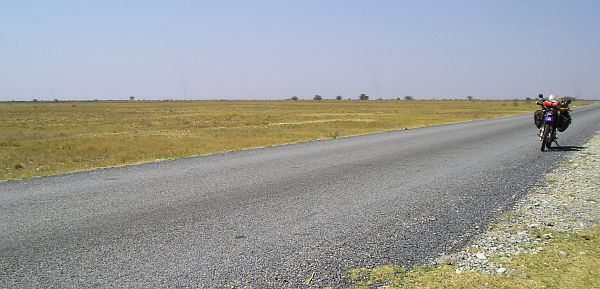
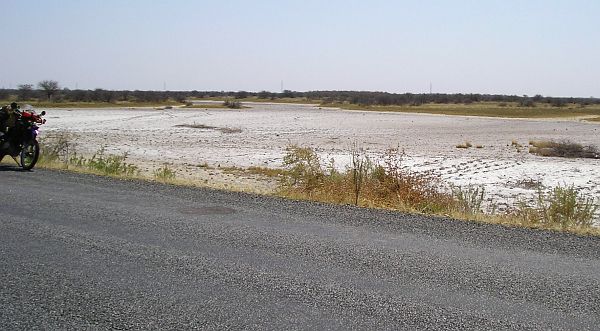
Then the first small salt pan, before the huge Sowa and Ntwetwe Pans over to the south of the road.
And a magnificent baobab at one of just a few roadside picnic places.
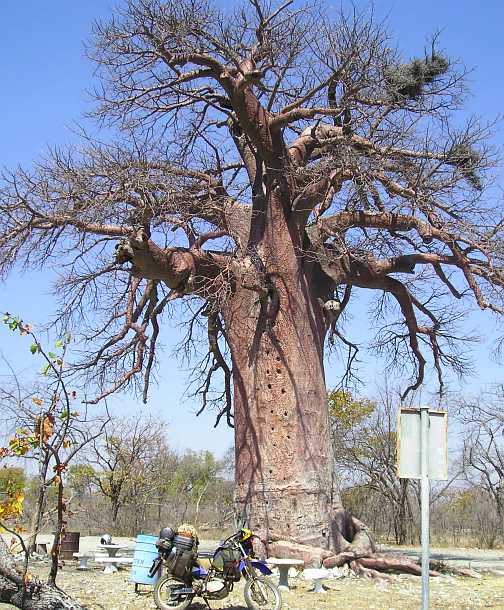
It even looked as though its legs were crossed sitting on the ground.
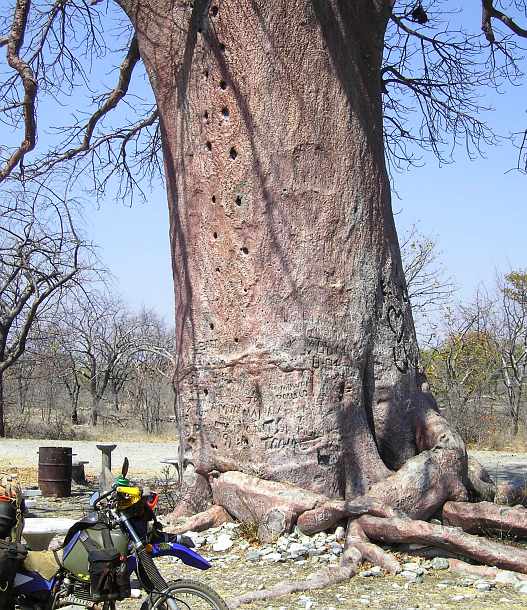
(At least it did in real life, if not in this photo)
That was the last item of any interest. The road from Gweta on to Maun (rhymes with 'town') takes the prize as the most boring road of the journey so far. Even the desert roads in the Sahara had atmosphere and mystery, but this road is 140 miles of desolate boredom. Mostly dead straight, dead flat, next to no other traffic, and absolutely no people.
And hot. Summer is here now.
The boredom moved me to stop to take a picture of the only things to catch the eye.
A couple of donkeys and a rubbish bin. Nothing else of note.
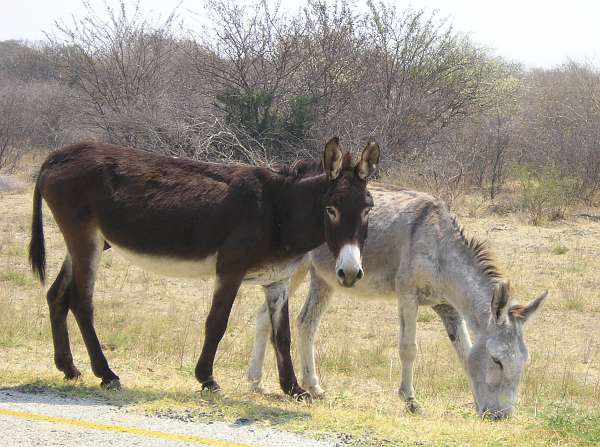
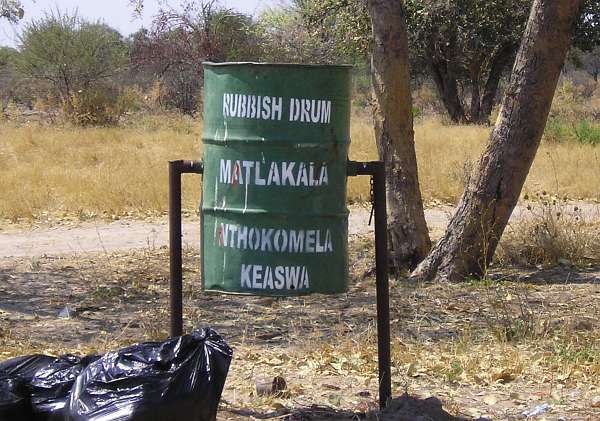
After a while I came to think that even a few telephone wires would add a bit of interest. But they too had stopped dead at the border, having stretched all the way across Zimbabwe from Mozambique, providing a little reassuring company.
Then the boredom must have got serious, because suddenly I realised I had some different company that just might provide a little mental entertainment.
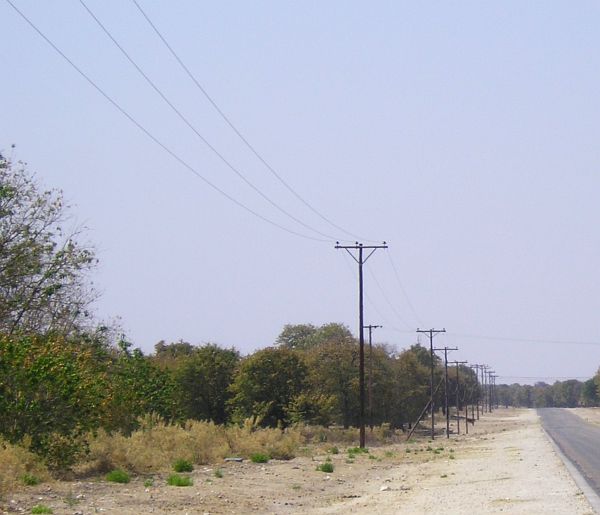
Not telephone wires, but power lines, a completely different kettle of fish. You plug your kettle into these, not your phone.
I found myself trying to judge what voltage they were carrying. The insulators were about six inches high with lots of thin ribs, so maybe quite modern. I couldn't find any other feature that might give a clue.
But then, joy of joys! A couple of poles had bright yellow labels on them proclaiming "33kV".
Well, that removed all the guess work. Maybe working out the power being carried by these wires would add something to the passage of time and ease the tedium on this endless road. (Or add to it maybe).
The conductors looked about six or eight millimetres diameter, a ladder and a micrometer would be handy - or even a clippon ammeter on a long pole!
No, this is 3-phase delta configuration, that wouldn't help.
In Bulawayo an electrical contractor's depot had a prominent position in town with its name in big letters: "Star Delta Contractors." Ah, that's what I needed, to remember the star-delta conversion formulas from college! Errrr, forty five years ago.
And power-factor corrections!
Nope, don't remember those either.
So I'll have to have a guess at the power being carried. At 33,000 volts I'd assume these lines are quite long, but don't know how long, except its another eighty miles to Maun....... and there are twelve spans between each joint......
No, I'm not interested in that either - but how else do you keep your mind active in retirement??
.......... you get the idea (I hope) about how boring this road was.........!!
And just in time, Maun appeared. Suddenly, like most African towns do in this part of the continent. A couple of tarmac side roads, traffic lights, followed by stacks of chrome-plated banks and supermarkets crowding the roads, Wimpy's hamburgers, shiny Shell and BP filling stations.
And colourful vegetation again. Almost, but not quite, tropical.
This is the south-east corner of the Okavango Delta and Maun is filled to bursting with safari operators in shiny chrome offices. But it seems not yet high season, so things are fairly quiet.
I set off up the road, followed by the powdery track, that stretches along the eastern side of the delta. The delta itself is all National Park with a hefty entrance fee. And the roads away from this track looked far too sandy for HM The Bike and I. Especially as one is on one's own.
So here are some photos from the track.
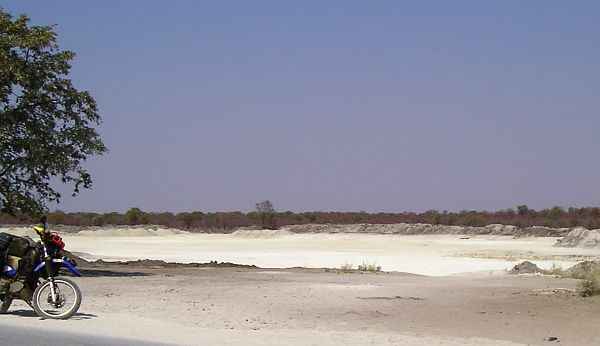
To the east of the delta is a massive salt-pan area. This is one tiny corner of one of the pans.
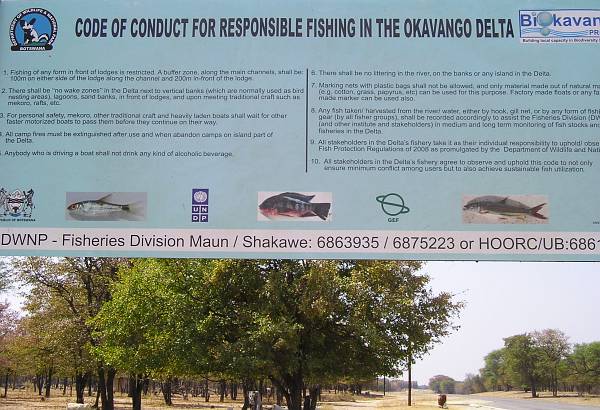
Huge signboard with list of environmental rules.
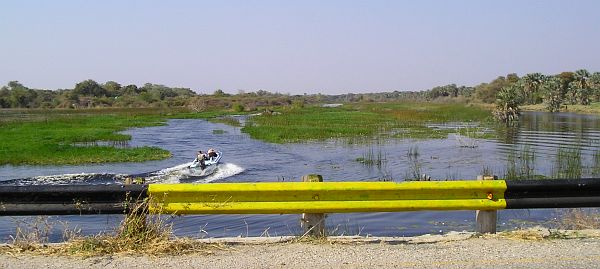
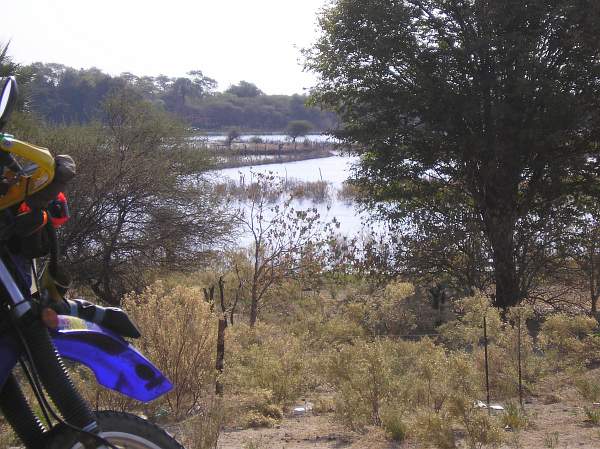
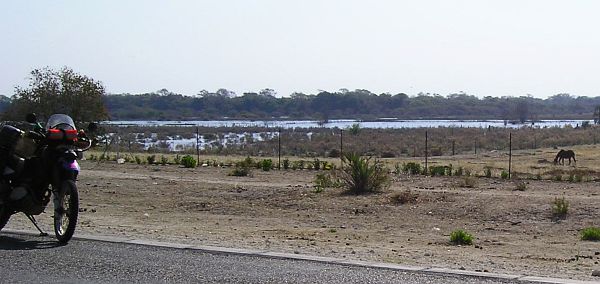
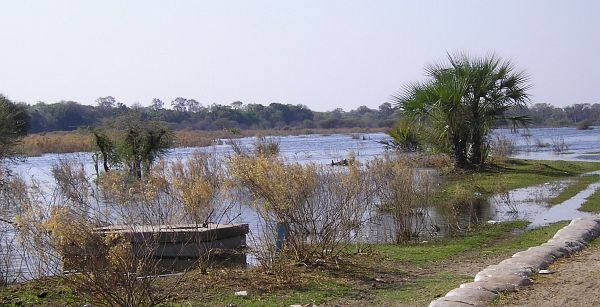
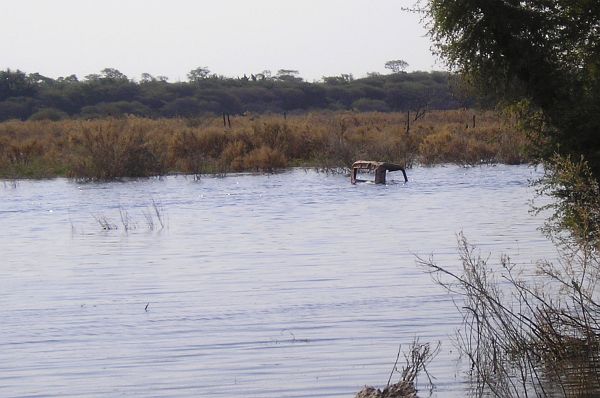
Plenty of parking on the Okavango Delta.
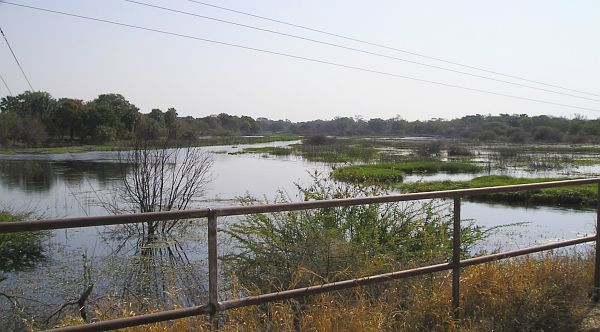
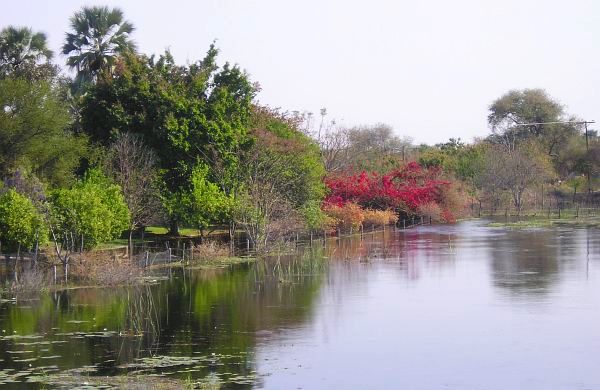
One of hundreds of posh water-front lodges on the Delta, concealed from view.
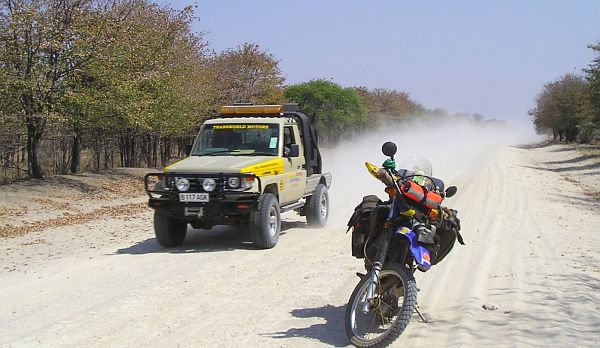
24 Hours after Air-Filter Washing Day.
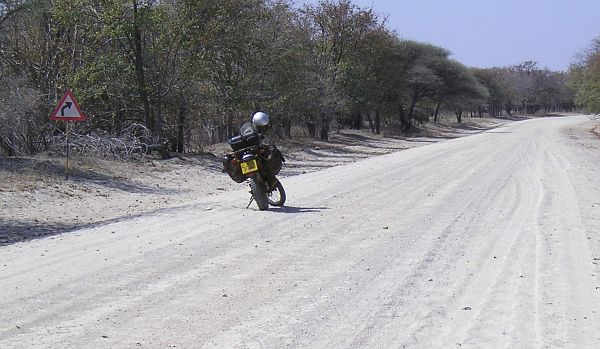
Further into the Delta. Finding that they've built bends into the road, I wasn't sure about continuing.
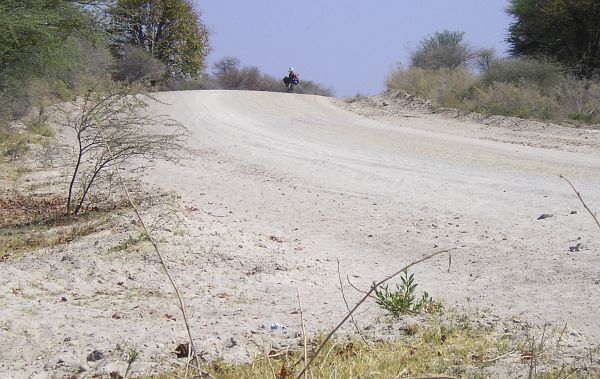
A Delta river bed, dry at the moment, crosses the track. They say the Delta has received more water from the feeder rivers this last couple of years than for many years before.
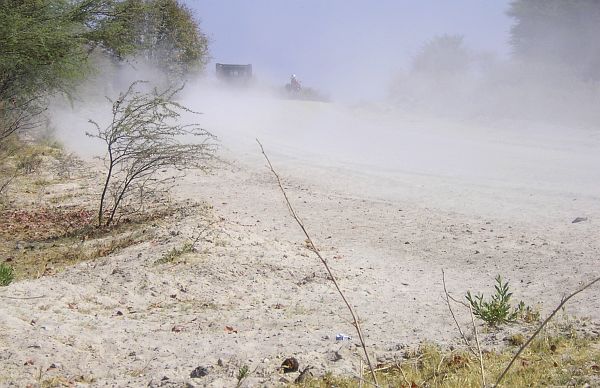
"Another fine mess you got my airfilter into."
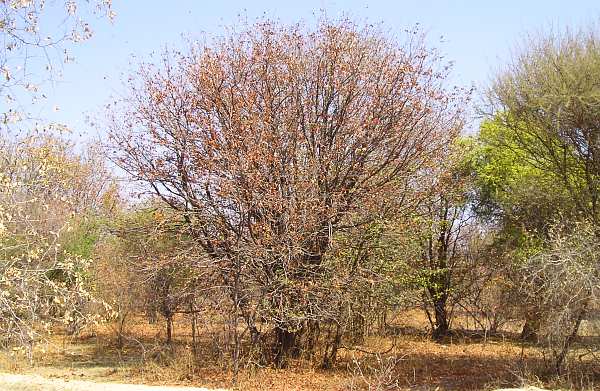
Delta trees in early summer.
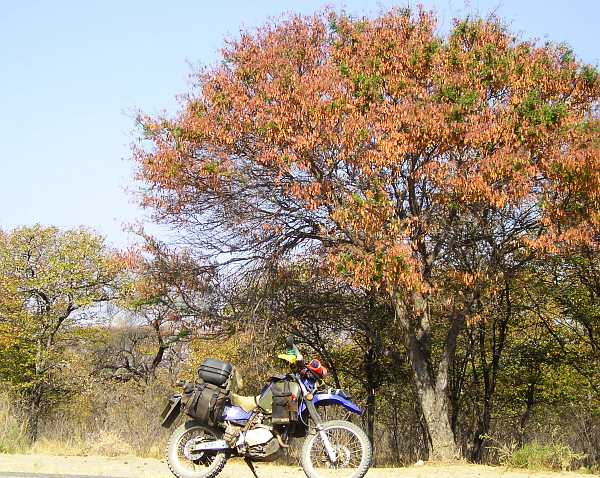

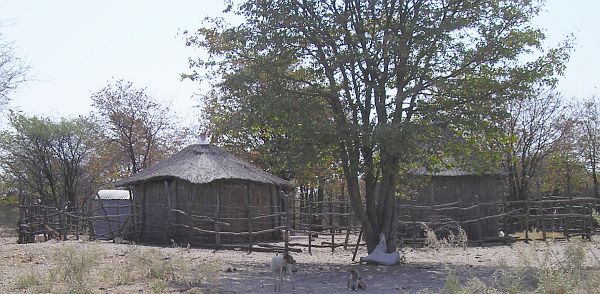
The Delta village of Phologelo.
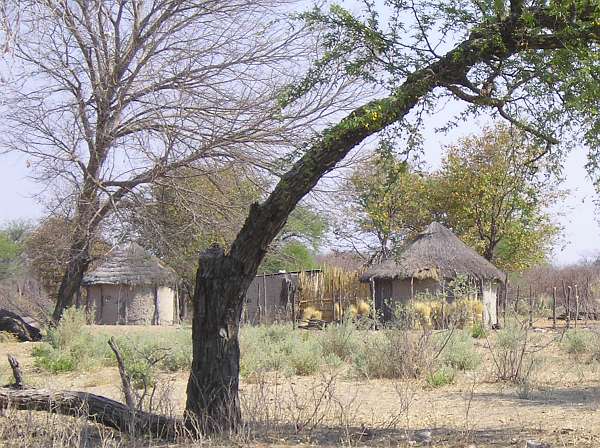
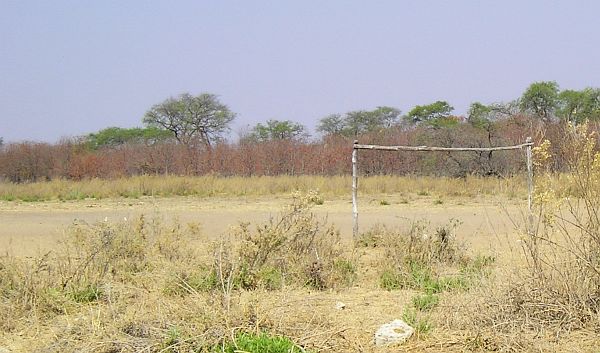
Okavango United football stadium out-of-season.
Between Francistown and Maun I stopped a couple of days in Gweta where I met a couple of French riders on KTMs, on a round-the-world trip. Travelling about three times as fast as me. They need to be in Buenos Aires before Christmas so aren't hanging about. They're doing some minor servicing so the conversation wanders in that direction. I learn that these bikes have a paper airfilter, which I think is necessary on this continent, but have an oil-impregnated foam filter as well, in front of it.
So, they told me, the foam filter can be washed in the normal way and makes the paper filter last a long time. The whole lot keeping a whole lot more dirt out of the engine than my little foam device.
That conversation, added to the never-ending need to 'do laundry' must have awakened a few slumbering brain cells, as I had the brilliant idea to wash the dirty filters in washing powder instead of petrol. And it seemed to work, and made the whole job a lot easier.
It certainly did work in one aspect. That is, I actually washed both of them at last as I no longer had to look around for empty plastic bottles and some way of disposing of the petrol. But just looking at those filters, and their open structure, tells me they're no good for this environment. Not when you've reached seventeen thousand miles with still a few thousand to go to the final goal. (Meaning another oil change just completed in Maun).
